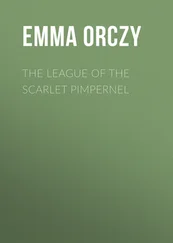Emma Orczy - The Heart of a Woman
Здесь есть возможность читать онлайн «Emma Orczy - The Heart of a Woman» — ознакомительный отрывок электронной книги совершенно бесплатно, а после прочтения отрывка купить полную версию. В некоторых случаях можно слушать аудио, скачать через торрент в формате fb2 и присутствует краткое содержание. Жанр: foreign_prose, foreign_language, на английском языке. Описание произведения, (предисловие) а так же отзывы посетителей доступны на портале библиотеки ЛибКат.
- Название:The Heart of a Woman
- Автор:
- Жанр:
- Год:неизвестен
- ISBN:нет данных
- Рейтинг книги:4 / 5. Голосов: 1
-
Избранное:Добавить в избранное
- Отзывы:
-
Ваша оценка:
- 80
- 1
- 2
- 3
- 4
- 5
The Heart of a Woman: краткое содержание, описание и аннотация
Предлагаем к чтению аннотацию, описание, краткое содержание или предисловие (зависит от того, что написал сам автор книги «The Heart of a Woman»). Если вы не нашли необходимую информацию о книге — напишите в комментариях, мы постараемся отыскать её.
The Heart of a Woman — читать онлайн ознакомительный отрывок
Ниже представлен текст книги, разбитый по страницам. Система сохранения места последней прочитанной страницы, позволяет с удобством читать онлайн бесплатно книгу «The Heart of a Woman», без необходимости каждый раз заново искать на чём Вы остановились. Поставьте закладку, и сможете в любой момент перейти на страницу, на которой закончили чтение.
Интервал:
Закладка:
Because of this, I think, he had never been a sportsman – or, rather, had never been an athlete, for he was splendid with a gun and the finest revolver shot in England, so I've been told, and an acknowledged master of fence, but with bat, ball, or racquet he was invariably clumsy.
He had always hated to be laughed at, and therefore had never gone through the rough mill of a tyro in athletics or in games. Arthur, one of his brothers, had been a blue at Oxford; the other one, James – you remember James de Mountford? was the celebrated cricketer; but he, the eldest, always seemed to remain outside that magic circle of sport, the great ring of many links which unites Englishmen one to another in a way that no other conformity of tastes, of breeding, or of religion can ever do.
Because of this diffidence too, no doubt, he had never married. I was told once by an intimate friend of his, that old Rad – as he was universally called – had never mustered up sufficient courage to propose to any woman. And as he saw one by one the coveted matrimonial prizes – the pretty girls whom at different times he had admired sufficiently to desire for wife – snapped up by more enterprising wooers, his dour moroseness grew into positive chronic ill-humour.
He liked no one and no one liked him: and during sixty years of life he had succeeded in eliminating from his entire being every feeling of sentiment save one. He had to all appearances an absolutely callous heart: he cared neither for dog nor horse – he ordered a splendid mare to be shot without the slightest compunction after she had carried him in the hunting field and in the park faithfully and beautifully for over eight years, just because she had shied at a motor-car and nearly thrown him. He was not cruel, you know, just callous in all respects save one: void of all sentiment – he called it sentimentality – save in his affection for Luke.
Luke had been – ever since he was a growing lad – the buffer in the establishment between the irascible master and the many subordinates. From Mr. Warren – the highly paid and greatly snubbed secretary – down to the maids below stairs, one and all brought troubles, complaints, worries to Mr. Luke. No one dared approach his lordship. A word out of season brought instant dismissal, and no one thought of leaving a place where, besides excellent wages, there was the pleasure of waiting on Mr. Luke. Never Mr. de Mountford, you notice, always Mr. Luke. He had grown up amongst the household; Winston, the old coachman, had taught him to ride; Mary, now housekeeper, then a nurse, had bathed him in a wash-hand basin when he was less than eighteen inches long.
Therefore the atmosphere of the gloomy old house pleased Louisa Harris. With the perfect and unconscious selfishness of a woman in love, she gauged everything in life just as it affected Luke. She even contrived to like Lord Radclyffe. He trod on every one of her moral and spiritual corns, it is true; he had that lofty contempt for the entire feminine sex which pertains to the Oriental, more than to the more civilized Western races; he combated her opinions, both religious and political, without any pretence at deference; he smoked very strong cigars in every room in the house, without the slightest regard for the feelings of his lady visitors; he did or left undone a great many other things which would tend to irritate and even to offend a woman accustomed to the conventional courtesies of daily social life; but when Luke entered a room, where, but a moment ago, Lord Radclyffe had been venting his chronic ill-humour on an offending or innocent subordinate, the old man's dour face would become transfigured, irradiated with a look of pride and of joy at sight of the man on whom he had lavished all the affection of which his strong nature was capable.
Luke could do no wrong. Luke was always right. He could argue with his lordship, contradict him, obtain anything he liked from him. Eternal contradictions of human nature: the childless man in perfect adoration before a brother's son; the callous, hard-hearted misanthrope soft as wax in the hands of one man.
CHAPTER VII
THE PART PLAYED BY A FIVE-POUND NOTE
And it was into this atmosphere of gloom and of purposeless misanthropy that Louisa Harris brought this morning the cheering sunshine of her own indomitable optimism.
She knew of course from the first that the subject which interested every one in the house more than any other subject could ever do was not to be mentioned in Lord Radclyffe's presence. But she was quite shrewd enough to see that dear old Luke – unsophisticated and none too acute an observer – had overestimated his uncle's indifference to the all-absorbing matter.
The old man's face – usually a mirror of contemptuous cynicism – looked, to the woman's keener insight, distinctly troubled, and his surly silence was even more profound than hitherto.
He hardly did more than bid Louisa a curt, "How de do?" when she entered, and then relapsed into moroseness wholly unbroken before luncheon was announced.
Jim – "in the Blues" – was there when she arrived, and Edie came in a few moments later, breathless and with hat awry and tawny hair flying in all directions, straight from a tussle with the dogs and the sharp wind in the park.
Evidently no secret had been made before these two of the strange events which had culminated this very morning in their brother's avowal to Louisa, and the postponement sine die of the wedding. But equally evidently these young creatures absorbed in their own life, their own pursuits and amusements, were not inclined to look on the matter seriously.
Their sky had been so absolutely cloudless throughout their lives that it was impossible for them at the moment to realize that the dark shadow on the distant horizon might possibly conceal thunder in its filmy bosom.
Edie – just over twenty years of age and already satiated with the excitement of three London seasons, her mind saturated with novel reading and on the lookout for some new sensations – was inclined to look on the affair as an exhilarating interlude between the Shrove Tuesday dance at Wessex House and the first Drawing-Room in May. Jim – "in the Blues" – very eligible as a possible husband for the daughters of ambitious mammas, a trifle spoiled, a little slow of wit, and not a little self-satisfied – dismissed the whole incident as "tommy-rot."
When Louisa first greeted them, Edie had whispered excitedly:
"Has he told you?"
And without waiting for a direct reply had continued, with unabated eagerness:
"Awful exciting, don't you think?"
But Jim with the elegant drawl peculiar to his kind had suppressed further confidences by an authoritative:
"Awful rot I call it, don't you? Luke is soft to worry about it."
Strangely enough, at luncheon it was Lord Radclyffe who brought up the subject matter. Edie with the tactlessness of youth had asked a point-blank question:
"Well," she said, "when is that wedding to be? and what are we bridesmaids going to wear? I warn you I won't have white – I hate a white wedding."
Then as no answer came she said impatiently:
"I wish you'd name the day, you two stupids. Awfully soft I call it hanging about like this."
Luke would have said something then, but Louisa interposed.
"It is all my fault, Edie," she said. "You know I want to take the twins out myself this season. I must give them a real good time before I marry."
"Bosh!" remarked Edith unceremoniously. "Mabel and Chris will have a far better time when you are married and can present them yourself. Tell them from me that its no fun being 'out' and the longer they put it off the better they'll enjoy themselves later on. Besides, Colonel Harris will take them about."
Читать дальшеИнтервал:
Закладка:
Похожие книги на «The Heart of a Woman»
Представляем Вашему вниманию похожие книги на «The Heart of a Woman» списком для выбора. Мы отобрали схожую по названию и смыслу литературу в надежде предоставить читателям больше вариантов отыскать новые, интересные, ещё непрочитанные произведения.
Обсуждение, отзывы о книге «The Heart of a Woman» и просто собственные мнения читателей. Оставьте ваши комментарии, напишите, что Вы думаете о произведении, его смысле или главных героях. Укажите что конкретно понравилось, а что нет, и почему Вы так считаете.












